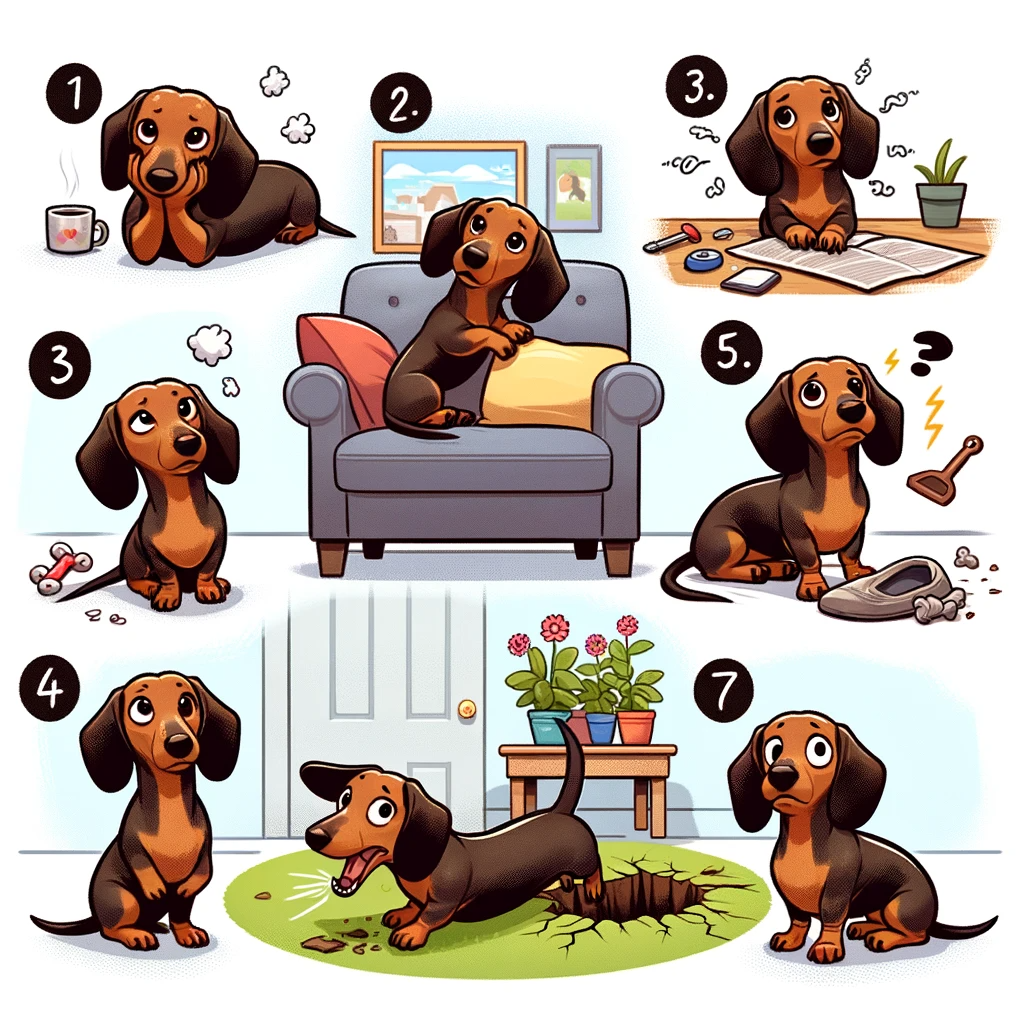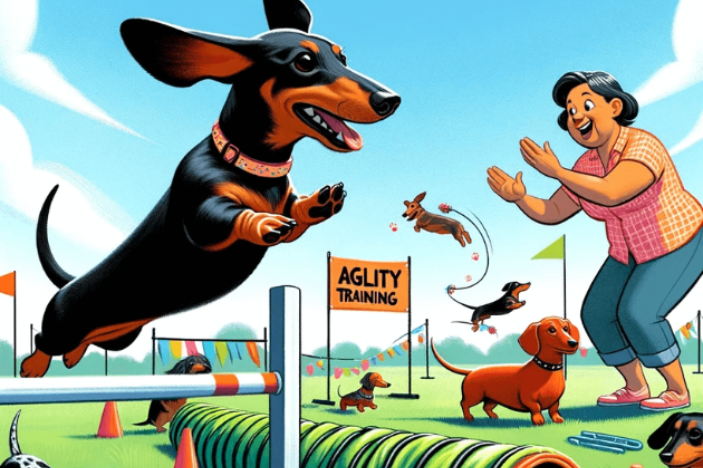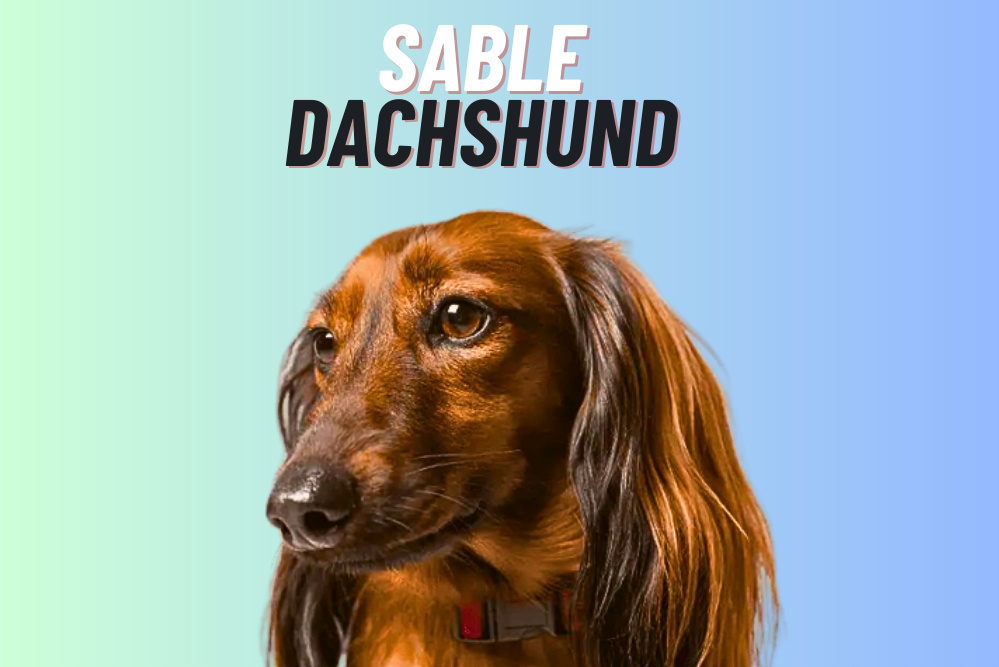Like any dog breed, Dachshunds can bite if they feel threatened or are poorly trained. However, it’s important to note that aggression is not a common trait in Dachshunds, and they are generally friendly and affectionate dogs.
Dachshunds were originally bred as hunting dogs, and their instinct to chase and grab prey can sometimes manifest as nipping or biting behavior.
Additionally, Dachshunds can be very protective of their owners and may exhibit aggressive behavior if they feel that their family is in danger.
To prevent biting behavior, it’s important to socialize and train your Dachshund from a young age, teaching them appropriate behavior around people and other animals.
Additionally, providing your Dachshund with plenty of exercises, mental stimulation, and attention can help prevent behavioral issues.
If you are concerned about your Dachshund’s biting behavior, it’s always best to consult with a professional dog trainer or behaviorist who can assess your dog’s behavior and provide guidance on how to address any issues
Do dachshunds bite their owners?
While it is possible for Dachshunds to bite their owners, it is not common behavior for this breed. Dachshunds are generally loyal and affectionate dogs who form strong bonds with their owners.
However, biting behavior can sometimes occur if a Dachshund feels threatened, scared, or is not properly trained. It’s important to socialize and train your Dachshund from a young age to help prevent biting behavior.
If your Dachshund does exhibit biting behavior, it’s important to address the issue promptly to prevent it from escalating. Consult with a professional dog trainer or behaviorist to assess your Dachshund’s behavior and provide guidance on how to address any issues.
Can dachshund bites child?
Any dog breed, including Dachshunds, can potentially bite a child. However, it’s important to note that biting behavior is not a common trait in Dachshunds, and they are generally friendly and affectionate dogs.
Dachshunds, like all dogs, should always be supervised around children, especially younger children who may not understand how to properly interact with a dog. Children should be taught how to approach and handle dogs gently, and should never be left alone with a dog.
To prevent biting behavior, it’s important to socialize and train your Dachshund from a young age, teaching them appropriate behavior around people, including children. Additionally, providing your Dachshund with plenty of exercises, mental stimulation, and attention can help prevent behavioral issues.
If you have concerns about your Dachshund’s behavior around children, it’s always best to consult with a professional dog trainer or behaviorist who can assess your dog’s behavior and provide guidance on how to address any issues
Do Dachshunds have a strong bite?
Dachshunds have a relatively strong bite for their size, but they are not considered to have one of the strongest bites among dog breeds. The strength of a Dachshund’s bite can vary depending on the individual dog’s size, age, and genetics.
Dachshunds were originally bred as hunting dogs and were used to dig into burrows to catch small game such as rabbits and badgers. This required a certain amount of jaw strength to be able to grip and hold onto prey.
While Dachshunds can have a strong bite force, it’s important to note that their temperament and behavior are much more important factors when considering them as a pet. Proper training and socialization can help prevent any unwanted biting behavior.
Do Dachshunds suddenly aggressive?
While aggression is not a common trait in Dachshunds, it is possible for any dog, including Dachshunds, to become aggressive suddenly. This can occur due to a variety of reasons, such as fear, pain, illness, or changes in their environment or routine.
If you notice sudden aggression in your Dachshund, it’s important to address the issue promptly to prevent it from escalating. First, take your dog to a veterinarian to rule out any underlying medical issues that may be causing the sudden aggression.
If no medical issues are found, consult with a professional dog trainer or behaviorist to assess your Dachshund’s behavior and provide guidance on how to address any issues.
It’s also important to note that prevention is key to avoiding sudden aggression. Proper socialization and training from a young age can help prevent behavioral issues in Dachshunds, and providing your dog with plenty of exercises, mental stimulation, and attention can also help prevent aggressive behavior.
Bite Anatomy of the Dachshund
The anatomy of a Dachshund’s bite is similar to that of other dog breeds. Dachshunds have a typical dog bite pattern, with a strong jaw and sharp, pointed teeth that are designed to tear and rip apart their prey.
Dachshunds have 42 teeth, which include incisors, canines, premolars, and molars. Their incisors are located at the front of the mouth and are used for biting and grasping.
while their canines are located behind the incisors and are used for tearing and holding onto prey. Their premolars and molars are located at the back of the mouth and are used for grinding and crushing food.
Dachshunds also have a bite force that is relatively strong for their size, with an average bite force of about 230 PSI (pounds per square inch). However, this is still much lower than larger dog breeds like the Rottweiler or the Pit Bull, which have bite forces that can exceed 300 PSI.
It’s important to note that while Dachshunds have the potential to bite, they are not aggressive dogs by nature. Proper socialization, training, and responsible ownership can help prevent biting behavior in Dachshunds and promote a healthy and happy relationship between the dog and its owners
What is a Dachshund’s Bite Strength?
The bite strength of a Dachshund can vary depending on the individual dog, but on average, it ranges from around 120 to 140 pounds of force per square inch (PSI).
This means that a Dachshund’s bite is relatively strong for its small size, but it is not as powerful as larger dog breeds like the Rottweiler or the Pit Bull, which can have bite forces that exceed 300 PSI.
It’s important to note that bite strength is not the only factor that determines a dog’s potential for aggression. Many factors, including genetics, socialization, training, and environmental factors, can all play a role in a dog’s behavior.
It’s also important to remember that all dogs have the potential to bite, regardless of breed or size. Responsible ownership, proper socialization, and training are key to preventing aggressive behavior and promoting a healthy and happy relationship between a Dachshund and its owners
How to Recognize a Dachshund’s Bite Strength?
It’s not easy to recognize a Dachshund’s bite strength just by looking at the dog, as it can vary from dog to dog and depends on several factors such as age, size, and physical condition. However, you can look for certain signs that indicate the strength of a Dachshund’s bite.
One sign of a strong bite is the dog’s ability to easily break or shred objects with its teeth. If your Dachshund can easily tear apart toys or chew through hard objects, this may indicate that it has a relatively strong bite.
Another sign is the force with which your Dachshund bites down when playing or chewing. If your Dachshund applies significant pressure when biting down, this may indicate a relatively strong bite.
However, it’s important to remember that a Dachshund’s bite strength is just one factor that determines its potential for aggression. Many other factors, such as genetics, socialization, training, and environmental factors, can all play a role in a dog’s behavior.
Regardless of a Dachshund’s bite strength, responsible ownership, proper socialization, and training are key to preventing aggressive behavior and promoting a healthy and happy relationship between the dog and its owners
How Can I Protect Myself From a Dachshund?
While Dachshunds are generally friendly and affectionate dogs, any dog has the potential to bite if they feel threatened, scared, or are not properly trained. To protect yourself from a potential bite from a Dachshund, here are some tips to keep in mind:
- Approach with caution: Always approach a Dachshund slowly and calmly, and give the dog a chance to sniff and get to know you before attempting to pet or interact with them.
- Avoid making direct eye contact: Direct eye contact can be perceived as a threat by some dogs, so it’s best to avoid staring directly at a Dachshund’s eyes.
- Respect the dog’s boundaries: If a Dachshund appears fearful or uncomfortable, give the dog space and avoid touching or interacting with them until they feel more at ease.
- Don’t disturb a Dachshund while they’re eating or sleeping: Dogs can be protective of their food and resting spaces, so it’s best to avoid disturbing a Dachshund while they’re eating or sleeping.
- Teach children how to interact with dogs: Children should always be supervised around dogs and taught how to interact with them in a safe and respectful manner.
- Consider professional training: If you have concerns about your Dachshund’s behavior, consider working with a professional dog trainer or behaviorist to address any issues and ensure a safe and happy relationship between you and your dog.
By following these tips and treating a Dachshund with respect and care, you can help prevent potential biting incidents and promote a positive relationship between you and your dog.
Is It Possible To Prevent A Dachshund From Biting You?
Yes, it is possible to prevent a Dachshund from biting you by taking certain precautions and following good practices when interacting with the dog. Here are some tips to help prevent biting incidents:
- Socialization: Proper socialization is crucial to help a Dachshund learn how to interact appropriately with people and other dogs. This should start early in the dog’s life and continue throughout their adulthood.
- Training: Positive reinforcement training can help teach a Dachshund good behavior and commands, and reinforce positive interactions with people and other dogs.
- Exercise and mental stimulation: Dachshunds are an active breed that require daily exercise and mental stimulation to keep them healthy and happy. Providing plenty of exercise and interactive toys can help reduce boredom and prevent destructive behavior that may lead to biting.
- Supervision: Dachshunds should always be supervised when interacting with people, especially children. This can help prevent rough play or accidental harm that may trigger the dog to bite.
- Respect boundaries: It is important to respect a Dachshund’s boundaries and not push them beyond their comfort zone. If a Dachshund appears uncomfortable or fearful, it is best to give them space and not force interactions.
- Regular veterinary care: Regular checkups and veterinary care can help ensure that a Dachshund is healthy and not experiencing any underlying medical conditions that may cause them to be irritable or aggressive.
By following these tips and being responsible, you can help prevent a Dachshund from biting and ensure a safe and happy relationship with your dog.
However, it’s important to remember that all dogs have the potential to bite if they feel threatened or scared, so it’s important to always approach any dog with caution and respect their boundaries
What To Do If A Dachshund Bites You?
If a Dachshund bites you, it’s important to take immediate steps to treat the wound and prevent infection. Here are some steps to follow:
- Wash the wound: Use warm water and soap to clean the wound thoroughly, and then cover it with a sterile bandage or dressing.
- Seek medical attention: Even if the wound appears minor, it’s important to seek medical attention, particularly if the skin has been broken. A healthcare provider can assess the severity of the wound and determine whether additional treatment is needed, such as antibiotics or a tetanus shot.
- Report the bite: Report the bite to the appropriate authorities, such as your local animal control agency or police department. This can help identify any potential health risks and ensure that the dog is up-to-date on vaccinations.
- Follow-up care: Follow any instructions provided by your healthcare provider for wound care, and monitor the wound for signs of infection, such as redness, swelling, or pus.
- Seek professional help: If the bite was caused by a Dachshund that exhibits aggressive behavior or has a history of biting, it’s important to seek the help of a professional dog trainer or behaviorist to address the underlying issues and prevent future biting incidents.
It’s important to remember that while any dog has the potential to bite, responsible pet ownership and appropriate training can greatly reduce the risk of a biting incident.
If you’re unsure about how to interact with a particular dog or how to prevent biting incidents, it’s best to seek the advice of a professional dog trainer or behaviorist
Conclusion
In conclusion, The best way to protect yourself from a dog bite is to be aware of what your dog is doing and take control of the situation before it escalates. Don’t hesitate to use a leash when out walking your dog.
In conclusion, Dachshunds, like all dogs, have the potential to bite if they feel threatened, scared, or agitated. However, with proper socialization, training, exercise, and supervision, the risk of biting incidents can be greatly reduced.
It’s important to respect a Dachshund’s boundaries and be aware of their body language to prevent potential biting incidents.
If a Dachshund does bite, it’s important to take immediate steps to treat the wound, seek medical attention if necessary, report the bite, and seek professional help to address any underlying behavioral issues.
Overall, responsible pet ownership and appropriate handling of Dachshunds can help ensure a safe and happy relationship between the dog and their owner.




